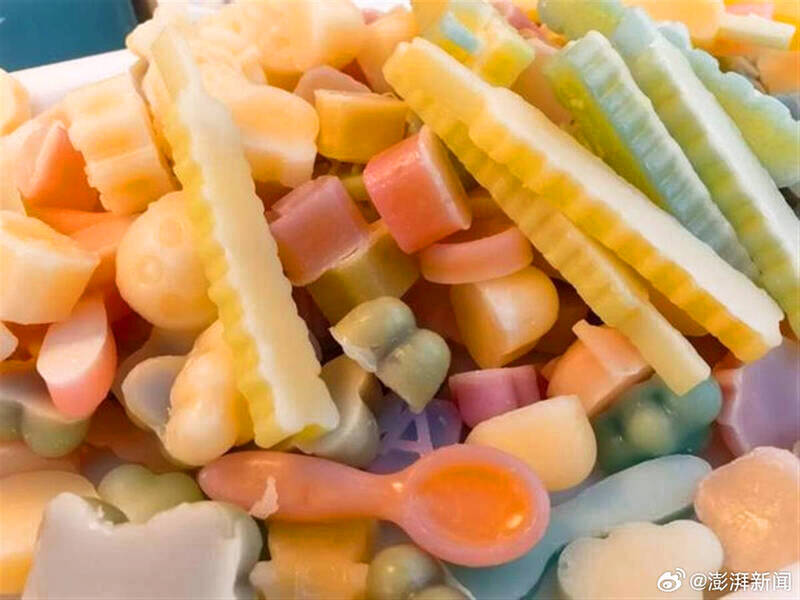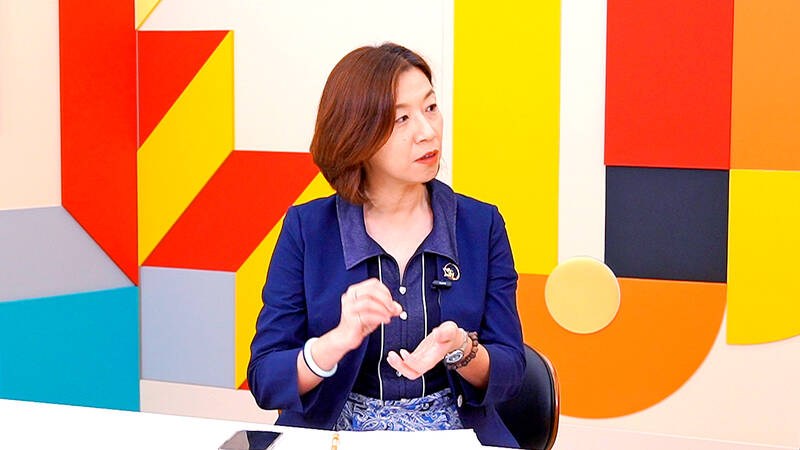The popularity of China-made wax candies is a significant food safety concern, as they have never been approved by the government, Deputy Minister of Health and Welfare Lin Ching-yi (林靜儀) said yesterday.
As the government has never received applications for imports of the confectionary, all those sold in Taiwan are illegal, Lin said in an interview with the Chinese-language Liberty Times (the sister newspaper of the Taipei Times).
People should think hard whether allowing children to eat something that was illegally imported into the country is a good idea, she said.

Photo: screen grab from the Internet
Lin said she first learned about its popularity among children when she saw it trending online and asked the Food and Drug Administration (FDA) about it.
The FDA said it had not received any application to import the candy, Lin said.
Local trade regulations clearly state that Chinese-made candies and snacks must conform to trade laws between Taiwan and China, she said.

Photo: Chiu Chih-jou, Taipei Times
The products must comply with Article 30 of the Act Governing Food Safety and Sanitation (食品安全衛生管理法), state product origins and undergo tests to see what kind of additives, if any, are included and whether it contains substances banned in Taiwan, she said.
People might buy snacks in China and share them with friends in school, which would be hard to ban, but selling such snacks at night markets or stores is illegal, she said.
City and county bureaus and health departments nationwide are investigating possible infractions, she said, sharing how the Kaohsiung Department of Health on Tuesday fined night market vendors illegally selling the confectionary.
Consumers should be alert when they see product labels that are not clear or do not use a language commonly used in Taiwan.
They must know how to interpret information correctly to protect their health and uphold food safety, she said.
Food safety regulations are constantly being updated, including regulations on labeling, which demand that all products carry information such as the manufacturer’s name, origin and product contents, she said.
The deputy minister added that consumers can verify this information on the Ministry of Health and Welfare Web site and with the Ministry of Agriculture.

Three Taiwanese airlines have prohibited passengers from packing Bluetooth earbuds and their charger cases in checked luggage. EVA Air and Uni Air said that Bluetooth earbuds and charger cases are categorized as portable electronic devices, which should be switched off if they are placed in checked luggage based on international aviation safety regulations. They must not be in standby or sleep mode. However, as charging would continue when earbuds are placed in the charger cases, which would contravene international aviation regulations, their cases must be carried as hand luggage, they said. Tigerair Taiwan said that earbud charger cases are equipped

Foreign travelers entering Taiwan on a short layover via Taiwan Taoyuan International Airport are receiving NT$600 gift vouchers from yesterday, the Tourism Administration said, adding that it hopes the incentive would boost tourism consumption at the airport. The program, which allows travelers holding non-Taiwan passports who enter the country during a layover of up to 24 hours to claim a voucher, aims to promote attractions at the airport, the agency said in a statement on Friday. To participate, travelers must sign up on the campaign Web site, the agency said. They can then present their passport and boarding pass for their connecting international

Taiwan sweltered through its hottest October on record, the Central Weather Administration (CWA) said yesterday, the latest in a string of global temperature records. The main island endured its highest average temperature since 1950, CWA forecaster Liu Pei-teng said. Temperatures the world over have soared in recent years as human-induced climate change contributes to ever more erratic weather patterns. Taiwan’s average temperature was 27.381°C as of Thursday, Liu said. Liu said the average could slip 0.1°C by the end of yesterday, but it would still be higher than the previous record of 27.009°C in 2016. "The temperature only started lowering around Oct. 18 or 19

WEATHER Typhoon forming: CWA A tropical depression is expected to form into a typhoon as early as today, the Central Weather Administration (CWA) said yesterday, adding that the storm’s path remains uncertain. Before the weekend, it would move toward the Philippines, the agency said. Some time around Monday next week, it might reach a turning point, either veering north toward waters east of Taiwan or continuing westward across the Philippines, the CWA said. Meanwhile, the eye of Typhoon Kalmaegi was 1,310km south-southeast of Oluanpi (鵝鑾鼻), Taiwan’s southernmost point, as of 2am yesterday, it said. The storm is forecast to move through central